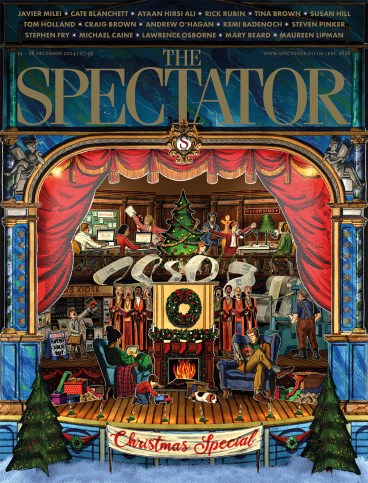
Ruination begins with an ironic prologue in which a choric figure warns the audience that what follows makes unlikely matter for the festive season: look elsewhere if you’re after light entertainment, he says, because this is going to shake you up a bit. And it does. This is genre-defying physical theatre, ‘devised’ by Ben Duke, in which spoken text is combined with episodes of dance and interludes of song, playfully satirical in tone and uprooted from any boundaries of realism or historical period.
Although it is somewhat pretentious, I pretty much loved it
The choric figure is Hades, and his realm of death is the setting. Jason and Medea have just been released from their bodybags, both vying to take sole custody over their children, murdered by Medea in revenge for Jason’s sexual betrayal. Somewhat in the manner of Aeschylus’s Eumenides, the stage becomes a courtroom where the ethics of the case are debated and revisited.
Just how guilty is this slippery Medea? At first Hannah Shepherd-Hulford presents her as Jason’s willing accomplice in the theft of the Golden Fleece, then as a bored nag of a housewife who has had it with her philandering husband. Was Jason seduced and then lied to? Should Medea get off with manslaughter? Or should she drink from the water cooler of forgetfulness, kiss and make up? At intervals, the characters stop talking and instead use their bodies to reveal themselves and their emotions, moving energetically between dance and mime to the accompaniment of melancholy baroque arias and torch songs.
This may sound dire, but although it is somewhat pretentious and over-extended by about ten of its hundred minutes, I pretty much loved it. Scratchy wit and airy disrespect for any stylistic rules are among its virtues: it’s never flat-footed and captures something of the authentically hard comic edge of Greek myth. Nor can there be any disputing the excellence of the production, sparely designed by Soutra Gilmour across the full extent of the Linbury Theatre’s bare walls, or the wonderfully versatile and resourceful cast – notably Liam Francis, whose flirty Jason gamely maintains his dignity – even when left naked and clutching his genitals.
Cinderella was Frederick Ashton’s first full-length ballet, conceived as a reaction to the chilly postwar austerity of 1948 during which innocent fairy tale romance provided some necessary solace. The result is not altogether successful. Its Victorian panto elements haven’t worn well and the Ugly Sisters have never been truly funny – at least not since Robert Helpmann and Ashton himself camped up their real-life antagonism in drag.
Ashton doesn’t make anything substantial of events after the ball – Prokofiev’s score gave him no help – leaving the third act an empty anti-climax. But there are wonderful things along the way, notably the superb sequence that attends the heroine’s transformation from rags to riches and the ingenious management of the ensembles. Here Ashton isn’t hampered by the demands of narrative or character; he is simply creating dance of neo-classical elegance, in the same spirit as his abstract masterpieces of the same period, Symphonic Variations and Scènes de ballet.
Wendy Ellis Somes’s staging, revived here for the first time since its première last year, seems geared towards the market for Wicked: it features some hideously garish costumes, and I think that overall Ashton was after something warmer and subtler.
Many casts are offered over Christmas: I plumped for Fumi Kaneko, a ravishing beauty not suited to the role of kitchen waif, but gorgeous in her ballroom finery. William Bracewell was her handsome prince. Both danced competently, neither tugged at the heartstrings. Claire Calvert, always so good, shone in the ‘Four Seasons’ divertissement, a great technical display of Ashton style, and the corps was crisp and sparkling. But something was lacking.








Comments